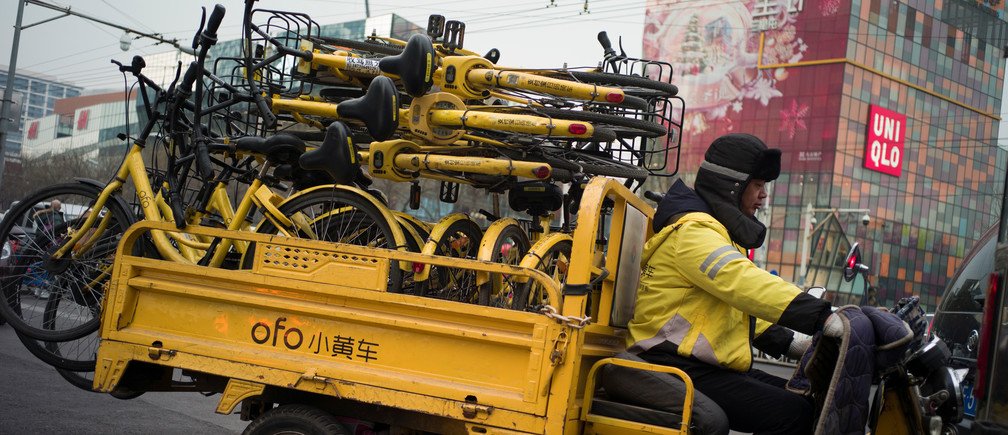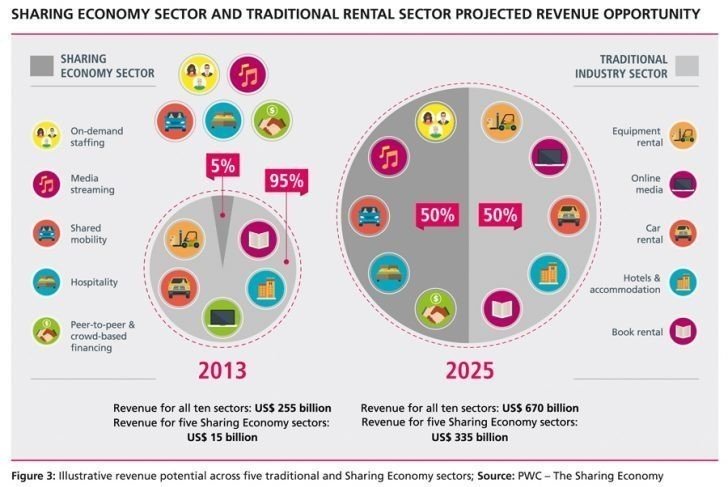
Date: 2025-04-06 Page is: DBtxt003.php txt00017587
World Economic Forum (WEF)
Sustainable Development
6 myths busted about the future of sustainable development ... Reflecting on the World Economic Forum's recent Sustainable Development Impact Summit in New York, here are some myths that were squashed in discussions.
Peter Burgess

A worker transports bicycles for bike-sharing startup Ofo in Beijing, China. Image: REUTERS/Thomas Peter
Reflecting on the World Economic Forum's recent Sustainable Development Impact Summit in New York, here are some myths that were squashed in discussions.
Myth 1: Disruption is all about the new
Digital disruption often conjures up images of futuristic cities, talking fridges, robots and autonomous vehicles. The reality is much less sci-fi. Many of the biggest environmental gains can come from updating and digitizing existing infrastructure. We heard in the forum that a staggering investment of $97 trillion in infrastructure is needed by 2040 to achieve the objectives outlined in the Sustainable Development Goals. Rather than making knee-jerk demands for new infrastructure, we must make more of what we already have.
The same is true for industry value chains. We don’t need to start again from scratch. I helped to lead a discussion group on global value chains, which account for more than 80% of trade flows and provide one in five jobs around the world. While it’s important to open new opportunities for start-ups, we must also cherish the contribution of established businesses, and help prepare them for value chain disruption.

Myth 2: Big challenges need big interventions from big players …
Undoubtedly, there is mounting pressure on major organizations – both private and public – to play a leading role in combatting major global issues. However, I was struck at the summit by the difference that social entrepreneurs are making in accelerating progress towards the SDGs.
When the Schwab Foundation announced its 2019 Social Innovators of the Year, it was interesting to hear how the foundation is helping these values-driven pioneers to work closer together. Poverty, inequality and climate change are too large and complex for any single social entrepreneur or institution to tackle alone; therefore the way forward is with dynamic interactions and multi-stakeholder partnerships.
I really like this line of thinking. And I believe that trust-enabling technology such as blockchain can help, by allowing partners to bypass the go-betweens, so avoiding the risk of error, delay, bureaucracy and, yes, disinformation.
Myth 3: ... but those big players aren’t welcome in the sharing economy
When we talk about the sharing economy, the image that springs to mind is ride-sharing, free cycling or Airbnb. It’s grassroots, community-based and peer-to-peer. It’s meant to disrupt traditional industries, not inspire them. Right?
The summit showed that there’s a huge amount that organizations – both private and governmental – can learn from the founding principles of the sharing economy. For example, one session discussed the need for collaborative platforms, driven by technology, that will connect companies to jointly solve global challenges such as increasing geopolitical volatility, resource scarcity and rising cost of inputs. By working together in “coopetition”, corporations can create jobs and accelerate sustainable business growth – while embracing the possibilities of the Fourth Industrial Revolution.
Countries increasingly cooperate to share reserves of natural resources, such as water, wildlife and energy. However, 60% of the world’s transboundary river basins lack cooperative agreements. Cross-border data-sharing is a powerful policy tool to better manage these reserves. Reaching out is better for business than holding back.
Myth 4: Acting sustainably is inconvenient
I chaired a lively session with Tom Szaky, CEO of TerraCycle, on sustainable consumption and production. In effect, how to do more with less across the product life cycle. Our burning question to the audience was: What does it take to empower sustainable and convenient choices for both consumers and producers?
TerraCycle do amazing work in waste management – basically taking on all the rubbish that most people think is unrecyclable. They also campaign to raise ambition on public and private commitments to the circular economy. While countries and companies are increasingly committing to circular economy roadmaps and targets, only 9% of materials worldwide are recycled back into our economies.
Our own purpose at Everledger is to contribute greater clarity and confidence in the marketplaces where increased transparency is essential. With information out in the open, we believe the value of many industries – from diamonds, to luxury goods, to e-waste management – will be shared by all stakeholders throughout the value chain.
Sustainable practices help make life and business easier. Besides, for many people – and young people in particular – being green isn’t a choice, but a responsibility. There was no escaping the resolve in the voice of 18-year-old Indonesian activist Melati Wijsen, who co-founded Bye Bye Plastic Bags with her sister, to fight for a ban on plastic bags, straws and styrofoam on her home island of Bali. The youth movement is here to stay, she told us. If the rest of the world can’t find solutions to the climate crisis, then young people will.

Myth 5: Batteries are bad
In recent years, the negative press around batteries and their reliance on metals and minerals has caused many to question whether they are in fact worse in sustainability terms than the fossil fuels they seek to replace. You didn’t need to sit long at the summit to realize that is simply not the case.
The session dedicated to scaling the battery value chain highlighted the need to ensure batteries are sourced, manufactured and recycled in a more responsible way. The main takeaway, however, was the potential of batteries for powering sustainable development.
The staggering reality is that battery technology could enable the transport and power sectors to reduce emissions by 30% by 2030, which would put global economies on track to meet their commitments for avoiding and mitigating climate change, as laid out in the Paris Agreement. This battery revolution could also create 10 million jobs, add $150 billion to the global economy and provide electricity to 600 million people for the first time. Wow.
Since 2017, Everledger has committed to supporting the Global Battery Alliance, with a view to raising more awareness around the challenges and opportunities of a sustainable battery value chain. By establishing traceability throughout the life cycle of high-risk products, the solutions the alliance proposes help to support reuse and responsible recycling of materials, from portable electronics batteries and metal components to electric vehicle batteries.
Myth 6: Blockchain is the answer to everything
Blockchain is not a silver bullet. This was a constant message in the sessions dedicated to harnessing the transparency and trust benefits of blockchain in the mining, metals and materials supply chains.
IBM coined the phrase “blockchain is a team sport”, and they are spot-on. It needs to run alongside a symphony of other technologies such as AI, the internet of things and nanotechnology, backed by a close working partnership with the relevant industry players. Done well, blockchain is a fundamental building block of a transparent value chain, making it easier for stakeholders to stay compliant, to drive efficiencies and to create unique value propositions in increasingly competitive global markets.
Organisations like the WEF and the OECD need to help ensure that blockchain remains a force for good. Carefully regulated, blockchain will benefit the widest number of people in the fairest way. If we create fractured systems, with a focus on efficiency rather than transparency, then blockchain risks losing the trust it can create.
------------------------------------------------------------
Share License and Republishing World Economic Forum articles may be republished in accordance with our Terms of Use.
Written by Leanne Kemp, Chief Executive Officer, Everledger
The views expressed in this article are those of the author alone and not the World Economic Forum.
Subscribe for updates A weekly update of what’s on the Global Agenda
Predictions for 2030: What if we get things right?
Read the series Most Popular
These will the most important global cities in 2035 Iman Ghosh · Visual Capitalist 31 Oct 2019
This is what 2030 could look like if we win the war on climate change Ida Auken 31 Oct 2019
Quantum leap: why the next wave of computers will change the world Andreas Baumhof 29 Oct 2019